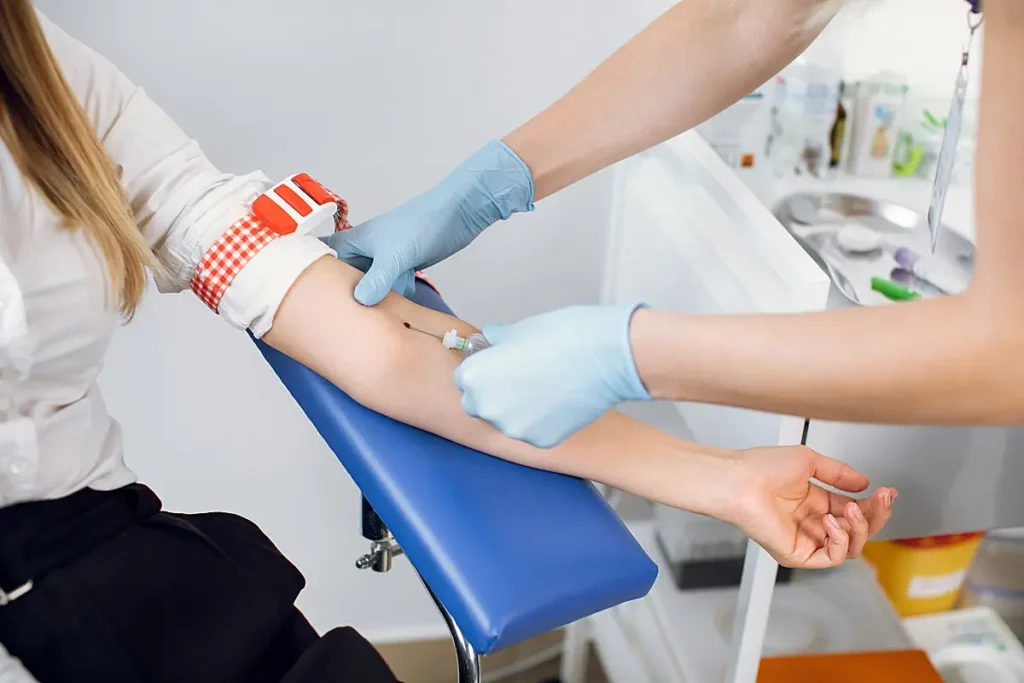Ever wondered if a simple blood test could hold the answers to understanding menopause? As women approach the “change of life,” questions often arise about the role of blood tests in diagnosing this transformative phase. This blog is here to address whether specific blood tests are required for menopause diagnosis, providing essential information to navigate this crucial aspect of a woman’s life. Let’s explore the physiological changes linked to menopause and how blood tests play a vital role in unraveling its complexities.
Contents
Are Blood Tests Required For Menopause Diagnosis?

Menopause, a natural phase marking the end of the reproductive years in a woman’s life, is often associated with various physical and hormonal changes. While there is no single blood test that definitively predicts menopause, doctors may employ certain indicators to assess this transformative phase.
Blood Tests: FSH and Estrogen Levels
Your doctor may order a blood test to evaluate levels of follicle-stimulating hormone (FSH) and estrogen. During menopause, FSH levels tend to increase, while estrogen levels decrease. These hormonal shifts are indicative of the changes occurring in the body during menopausal transition. While not a standalone diagnostic tool, these blood tests contribute to the overall assessment of menopausal status.
Physical Examination: Gathering Comprehensive Information
In addition to blood tests, a thorough physical examination is a crucial component of determining menopausal status. Your doctor will inquire about the date of your last period and the frequency of menopausal symptoms. This comprehensive approach allows for a more holistic understanding of your reproductive health.
Rule Out Other Conditions: Tests for Differential Diagnosis
Experiencing menopausal symptoms does not always confirm menopause, as similar symptoms can arise from other conditions. To rule out alternative causes, your doctor may order additional tests. These tests aim to eliminate possibilities such as ovarian failure or thyroid conditions. They may include:
- Ovarian Reserve Testing: Assessing the quantity and quality of remaining eggs in the ovaries.
- Thyroid Function Tests: Checking thyroid hormone levels to rule out thyroid-related issues.
This differential diagnosis helps ensure that menopause is accurately identified, and any underlying health concerns are addressed.
In conclusion, while no single blood test is a definitive marker for menopause diagnosis, a combination of assessments, including FSH and estrogen levels, along with a comprehensive physical examination and additional tests, aids in accurately diagnosing this transformative phase. Consulting with your healthcare provider allows for personalized evaluation and effective management of menopausal transitions.
What If It Is Menopause: What’s Next?
Upon confirming menopause, the journey doesn’t end; instead, it opens a new chapter where managing symptoms and ensuring a healthy lifestyle become paramount. Your doctor will play a pivotal role in guiding you through this phase, offering various treatment options tailored to your individual needs.
Medical Interventions: Medications and Hormone Therapies
 For women experiencing bothersome symptoms like hot flashes, mood swings, or sleep disturbances, medical interventions become valuable tools. Your healthcare provider may prescribe medications or hormone therapies designed to alleviate these symptoms and enhance your overall well-being. Hormone replacement therapy (HRT), for instance, can help balance hormonal levels, mitigating the impact of hormonal fluctuations during menopause.
For women experiencing bothersome symptoms like hot flashes, mood swings, or sleep disturbances, medical interventions become valuable tools. Your healthcare provider may prescribe medications or hormone therapies designed to alleviate these symptoms and enhance your overall well-being. Hormone replacement therapy (HRT), for instance, can help balance hormonal levels, mitigating the impact of hormonal fluctuations during menopause.
It’s crucial to engage in open and honest discussions with your doctor to understand the potential benefits and risks associated with these interventions. This collaborative approach ensures that the chosen treatment aligns with your health goals and preferences.
Lifestyle Changes: Empowering Self-Care
In addition to medical interventions, embracing certain lifestyle changes can significantly contribute to managing menopausal symptoms and optimizing your quality of life. Consider incorporating the following practices into your daily routine:
- Healthy Diet: A well-balanced diet rich in fruits, vegetables, and whole grains can provide essential nutrients and support overall health during menopause.
- Regular Exercise: Physical activity not only helps maintain a healthy weight but also contributes to mood stability and improved sleep. Activities like walking, yoga, or swimming can be beneficial.
- Stress Management: Menopause can be a stressful period, and stress may exacerbate symptoms. Practices such as meditation, deep breathing exercises, or mindfulness can aid in stress reduction.
- Adequate Sleep: Establishing good sleep hygiene is crucial. Create a conducive sleep environment, maintain a consistent sleep schedule, and address any issues affecting your sleep quality.
- Stay Hydrated: Adequate water intake is essential for overall health. It can also help manage symptoms like hot flashes.
- Social Support: Surround yourself with a supportive network of friends and family. Sharing experiences and seeking support can positively impact your emotional well-being.
Remember, every woman’s experience with menopause is unique. Therefore, finding a personalized combination of medical interventions and lifestyle adjustments is key to navigating this phase successfully. Regular communication with your healthcare provider ensures that your treatment plan remains tailored to your evolving needs, promoting a smoother and more comfortable transition through menopause.
Conclusion
In conclusion, the journey through menopause is a unique and transformative experience for every woman. While there is no single blood test that definitively determines menopausal status, a combination of assessments, including FSH and estrogen levels, aids in the overall diagnosis. Once menopause is confirmed, a collaborative approach with your healthcare provider becomes crucial.
The exploration doesn’t end with diagnosis; it’s a gateway to understanding and managing this phase effectively. Medical interventions such as medications and hormone therapies can alleviate bothersome symptoms, enhancing your overall well-being.
Remember, this is not just about managing symptoms; it’s about embracing a new chapter in life with vitality and resilience.
As menopause is a natural and inevitable part of a woman’s life, understanding and managing it holistically contribute to a healthier, more empowered future. Embrace the changes, prioritize self-care, and celebrate the wisdom that comes with this remarkable phase.
If you are facing menopause related issues, menopause treatment at HerMantra can help. Book your free trial online menopause treatment session now.


